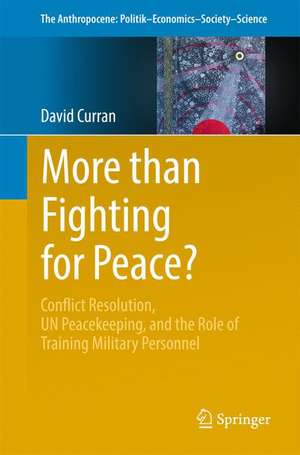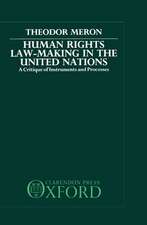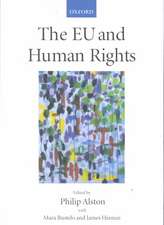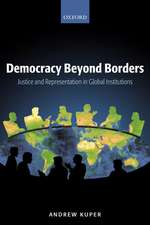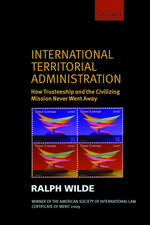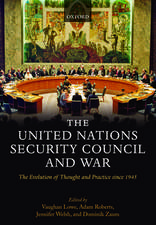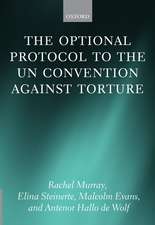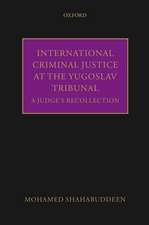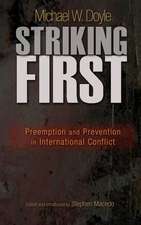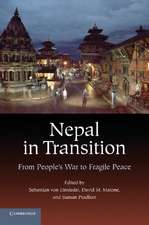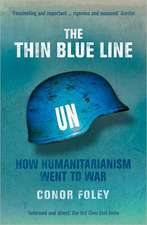More than Fighting for Peace?: Conflict Resolution, UN Peacekeeping, and the Role of Training Military Personnel: The Anthropocene: Politik—Economics—Society—Science, cartea 8
Autor David Curranen Limba Engleză Paperback – 21 dec 2016
Din seria The Anthropocene: Politik—Economics—Society—Science
-
 Preț: 403.48 lei
Preț: 403.48 lei -
 Preț: 361.89 lei
Preț: 361.89 lei -
 Preț: 380.63 lei
Preț: 380.63 lei - 20%
 Preț: 583.00 lei
Preț: 583.00 lei -
 Preț: 389.49 lei
Preț: 389.49 lei -
 Preț: 390.46 lei
Preț: 390.46 lei - 5%
 Preț: 361.80 lei
Preț: 361.80 lei -
 Preț: 379.09 lei
Preț: 379.09 lei -
 Preț: 384.48 lei
Preț: 384.48 lei -
 Preț: 380.84 lei
Preț: 380.84 lei -
 Preț: 451.26 lei
Preț: 451.26 lei -
 Preț: 391.40 lei
Preț: 391.40 lei -
 Preț: 430.21 lei
Preț: 430.21 lei -
 Preț: 387.75 lei
Preț: 387.75 lei -
 Preț: 378.34 lei
Preț: 378.34 lei -
 Preț: 418.29 lei
Preț: 418.29 lei - 5%
 Preț: 399.91 lei
Preț: 399.91 lei -
 Preț: 428.07 lei
Preț: 428.07 lei -
 Preț: 386.39 lei
Preț: 386.39 lei -
 Preț: 392.75 lei
Preț: 392.75 lei -
 Preț: 424.22 lei
Preț: 424.22 lei -
 Preț: 384.09 lei
Preț: 384.09 lei -
 Preț: 429.61 lei
Preț: 429.61 lei -
 Preț: 381.98 lei
Preț: 381.98 lei -
 Preț: 415.83 lei
Preț: 415.83 lei -
 Preț: 382.18 lei
Preț: 382.18 lei - 15%
 Preț: 647.40 lei
Preț: 647.40 lei - 18%
 Preț: 1123.04 lei
Preț: 1123.04 lei - 15%
 Preț: 579.34 lei
Preț: 579.34 lei - 18%
 Preț: 802.46 lei
Preț: 802.46 lei - 18%
 Preț: 944.51 lei
Preț: 944.51 lei -
 Preț: 383.33 lei
Preț: 383.33 lei -
 Preț: 383.33 lei
Preț: 383.33 lei -
 Preț: 383.33 lei
Preț: 383.33 lei -
 Preț: 380.07 lei
Preț: 380.07 lei -
 Preț: 417.52 lei
Preț: 417.52 lei
Preț: 413.66 lei
Nou
Puncte Express: 620
Preț estimativ în valută:
79.15€ • 82.94$ • 65.43£
79.15€ • 82.94$ • 65.43£
Carte tipărită la comandă
Livrare economică 11-25 aprilie
Preluare comenzi: 021 569.72.76
Specificații
ISBN-13: 9783319463032
ISBN-10: 3319463039
Pagini: 127
Ilustrații: IX, 150 p. 6 illus. in color.
Dimensiuni: 155 x 235 x 9 mm
Greutate: 0.24 kg
Ediția:1st ed. 2017
Editura: Springer International Publishing
Colecția Springer
Seria The Anthropocene: Politik—Economics—Society—Science
Locul publicării:Cham, Switzerland
ISBN-10: 3319463039
Pagini: 127
Ilustrații: IX, 150 p. 6 illus. in color.
Dimensiuni: 155 x 235 x 9 mm
Greutate: 0.24 kg
Ediția:1st ed. 2017
Editura: Springer International Publishing
Colecția Springer
Seria The Anthropocene: Politik—Economics—Society—Science
Locul publicării:Cham, Switzerland
Cuprins
1.Introduction.- 2. Peacekeeping, Conflict Resolution, and the Role of Training.- 3. The Development of Training Structures in the United Nations.- 4. Negotiation Training for Military Peacekeepers.- 5. Civil Military Relations.- 6. Towards the Military Conflict Resolution Practitioner?.- 7.Conclusion.
Recenzii
“This book offers a valuable contribution to the study of peacekeeping training practice. … More than Fighting for Peace is the first comprehensive study that traces the evolution of predeployment training and the political and pedagogic issues that impact on how peacekeeping training curriculum is designed and delivered. … Curran’s book offers an important contribution to the field of conflict resolution studies, critical peacekeeping/peacebuilding studies, and critical military studies … .” (Georgina Holmes, Armed Forces & Society, 2017)
Notă biografică
Dr. David Curran’s (UK) primary research interest is in developments in United Nations (UN) peacekeeping. Since completing his PhD at the Department of Peace Studies, University of Bradford in 2011, he has undertaken research into a range of topic areas including the role of conflict resolution in training programmes for military peacekeepers; Protection of Civilians in UN Peacekeeping; the evolution of rapid-reaction peacekeeping and peacebuilding forces such as the African Union standby brigades, EU battlegroups; and the potential of specialized UN rapid reaction capabilities. In addition, he has researched and published on the role of the United Kingdom in UN peacekeeping policy and practice.
Textul de pe ultima copertă
This book provides a contemporary account of the linkages between the academic field of conflict resolution and the practice of military peacekeeping, through the lens of pre-deployment training for military personnel about to embark on UN peacekeeping operations. Military personnel serving on United Nations peacekeeping operations are deployed into highly challenging post-conflict environments, where the likelihood of violence remains high. Moreover, these personnel are deployed part of a wider peace process, and are thus situated as an anchor point in a transition from war to peace. This dimension of their work therefore means that a range of skills and techniques are relied upon, which come not from traditional military training, but from other, non-traditional fields. It is into this gap where the academic field of conflict resolution has made a valuable contribution to understanding international peacekeeping. Since the 1970’s, studies have sought to understand internationalpeacekeeping as a necessary stage in conflict de-escalation, and ultimately transformation. From this, there is a history of engagement including studies which seek to understand the skills peacekeepers may need to assist them in their day to day activities, and the role that international peacekeeping plays in wider projects of conflict transformation.
Caracteristici
Contemporary analysis of the role that conflict resolution plays in United Nations peacekeeping operations, and the impact that peacekeeping has had on the field of conflict resolution Insight into strategies to train military peacekeepers preparing for UN operations in negotiation and civil military coordination Unique understanding of how UN peacekeeping policy has impacted training for military personnel Includes supplementary material: sn.pub/extras
